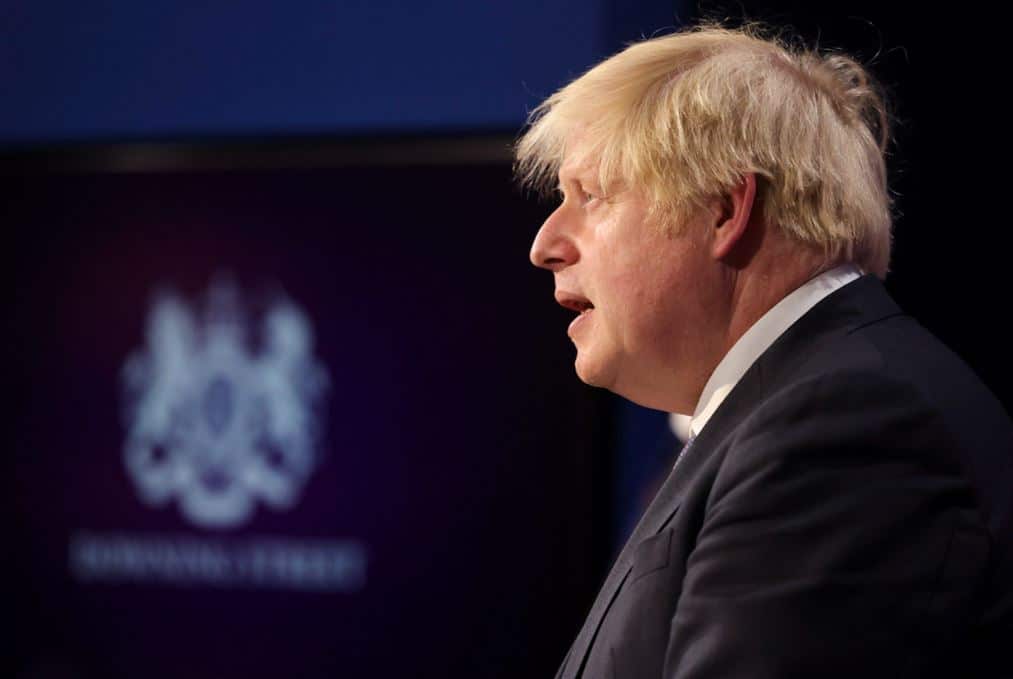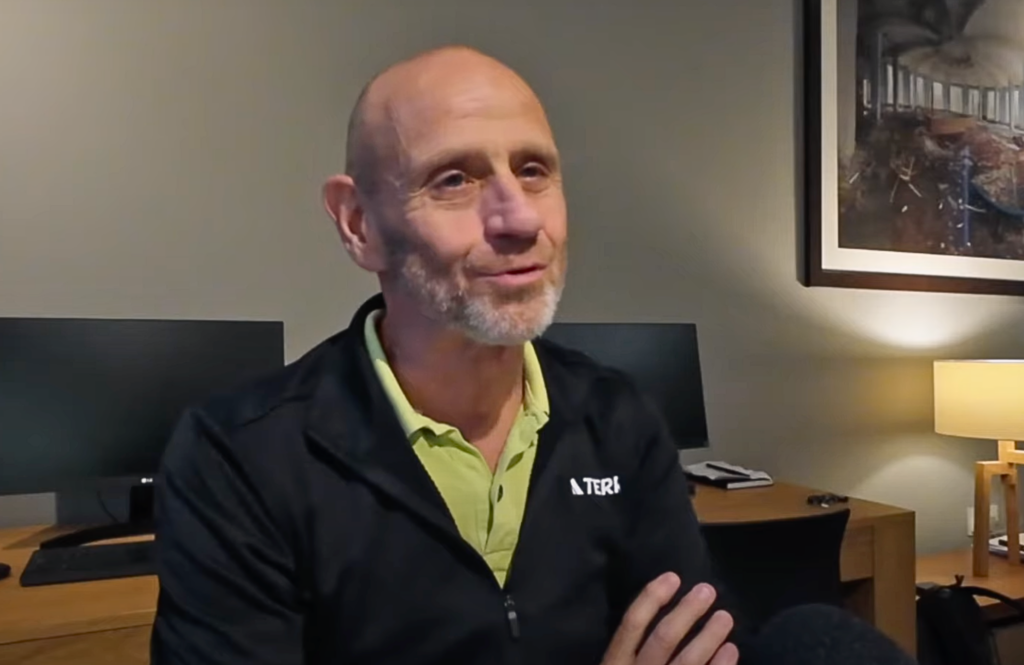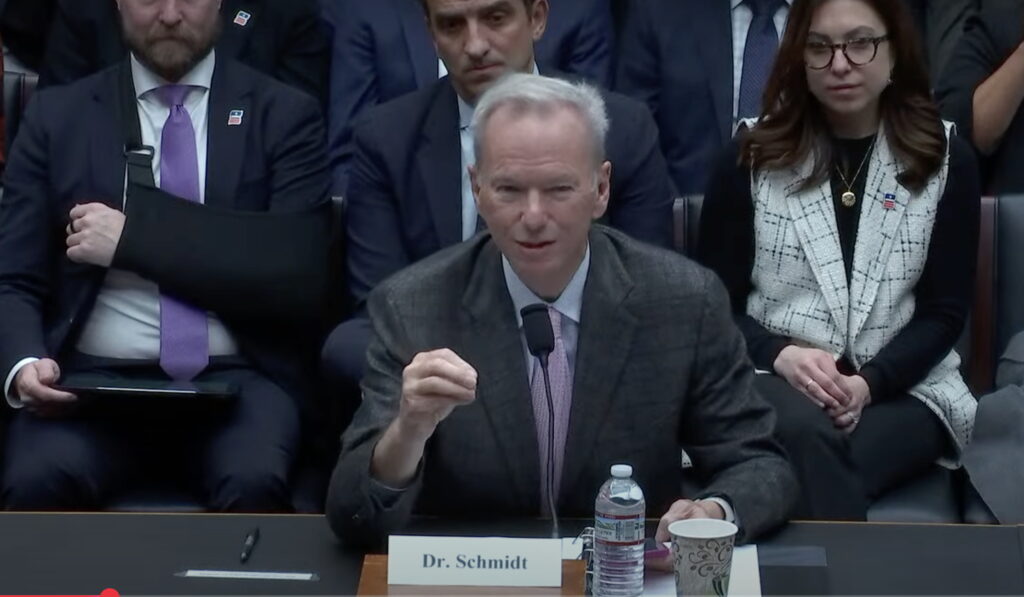Boris Johnson’s reshuffle has dominated the news this week – but what does it mean for government policy on climate change?
As might be expected, several cabinet ministers were involved in campaigning for Brexit, whose crossover with climate science denial and environmental deregulation DeSmog has reported on extensively.
The cabinet still contains four ministers (one of them promoted) who back in 2012 co-wrote a controversial book called Britannia Unchained, which takes a swipe at “government-subsidised green technology”.
The book by Kwasi Kwarteng, Liz Truss, Priti Patel and Dominic Raab, contrasts this with Silicon Valley’s investment in risky start-ups, which it praises as “capitalism in its rawest, most primordial form”.
Kwarteng’s views look to have changed slightly since then, though, with the Energy Secretary this week saying the climate crisis was the result of a “market failure”, arguing that sometimes “governments have to legislate and intervene”.
The reshuffle wasn’t the biggest shake-up in history, with Alok Sharma still COP26 President, Rishi Sunak – who is reportedly blocking green policies needed to reach net zero – in charge of the Treasury, and of course, the former climate sceptic and born-again environmentalist Johnson still as PM. George Eustice has also held onto his job as Environment Secretary.
The appointment of Simon Clarke as Chief Secretary to the Treasury was taken as a positive sign by green commentators, with James Murray of Business Green calling Clarke “one of the Tories who got the critical importance of net zero and the huge opportunities from clean tech first”.
But how do other ministers’ records on climate change stack up?
Liz Truss – Foreign Secretary
(Replaces Dominic Raab. Previously International Trade Secretary.)
As Trade Secretary, Liz Truss was tasked with securing post-Brexit trade deals, the most notable so far being the recent deal with Australia, from which key climate change commitments were reportedly dropped – something Truss has called “fake news”.
A former manager at oil giant Shell, Truss has like much of her party backed the expansion of Heathrow Airport and supported fracking, dismissing what she called “NIMBY” opposition.
As Environment Secretary in 2014, Truss called solar farms “ugly” and a “blight on the landscape”, and announced a cut in subsidies for the industry, claiming solar farms were a threat to food security. In a 2019 House of Commons debate, Truss called Extinction Rebellion protesters a “bunch of anti-capitalists that glue themselves to public transport”.
An ardent free-marketeer, in 2011 Truss founded the “Free Enterprise Group” of Conservative MPs, run by the Institute of Economic Affairs, and in 2018 met with Koch-funded libertarian groups in the US with a history of climate science denial.
In October 2019, ahead of the general election, Truss received a £3,000 donation from Michael Hintze, an Australian hedge fund manager who has helped fund the Global Warming Policy Foundation. That November, she received £2,000 from Jon Moynihan, a former member of the Vote Leave board and a director of the IEA’s “forum”.
In March 2019 she received £8,200 to fly to the US state of Georgia to speak at the world forum of the American Enterprise Institute, a thinktank funded by oil firms and climate science deniers.
Truss scored particularly badly in a 2019 analysis by DeSmog and the Guardian of MPs’ votes on climate change, being present for 10 votes and voting positively in two.
Anne-Marie Trevelyan – International Trade Secretary
(Replaces Liz Truss. Previously BEIS minister.)
Trevelyan got off to a bad start this week after the Guardian reported tweets she sent between 2010 and 2012 expressing climate science denial. One said: “Clear evidence that the ice caps aren’t melting after all, to counter those doom-mongers and global warming fanatics”. Another, opposing wind farms, said: “We aren’t getting hotter, global warming isn’t actually happening.” She also tweeted positively about Nigel Lawson, founder of the Global Warming Policy Foundation.
Trevelyan scored zero in the 2019 Guardian/DeSmog analysis mentioned above, being present for six votes and voting positively in none.
Trevelyan was heavily involved in the pro-Brexit campaign, sitting on the board of Vote Leave in the run-up to the 2016 referendum, as well as being a founding member of the Conservatives for Britain pressure group. She has spoken at events at Conservative Party conference organised by free market groups like the Institute of Economic Affairs and the Taxpayers’ Alliance.
Trevelyan’s time as BEIS minister was praised by Oil & Gas UK, the industry body, whose CEO Deirdre Michie said: “We would like to thank Ms Trevelyan very much indeed for working with us so closely and effectively, especially in relation to the North Sea Transition Deal.” The deal allows for new offshore oil and gas developments and will include a “climate compatibility” measure for deciding which projects get the go-ahead.
Simon Clarke (Chief Secretary to the Treasury)
Clarke’s promotion to the Treasury has been welcomed by some environmentalists. In 2019 he was recognised as “Britain’s greenest MP” by the Climate Coalition after coordinating a cross-party push to ask the government to deliver net zero emissions by 2050.
The MP won his seat in Middlesborough South and East Cleveland in 2017, when a wave of traditionally Labour seats fell to Tory candidates, and greatly increased his majority in the 2019 election.
The former exchequer to the secretary is a passionate advocate of clean technology, including more controversial efforts such as Carbon Capture and Storage. He recently wrote a column in the Times urging Tory sceptics to “get behind net zero”.
Kwasi Kwarteng – Business Secretary
(No change.)
Boris Johnson has displayed a degree of confidence in his green team ahead of COP26, by keeping the holders of the core environment-focused departments largely unchanged.
Kwasi Kwarteng, who was promoted to Secretary of State for Business, Energy and Industrial Strategy in January of this year, remains in post. The MP for Spelthorne and former Brexit minister joined the department in July 2019 and is set to be in office during the crucial UN Climate Change Conference in less than two months’ time.
Kwarteng still has to prove himself in the post, however. He has failed to deliver a number of key decarbonisation schemes – including the government’s Green Homes Grant, which was scrapped after just six months.
Meetings held by Kwarteng have also attracted unwanted scrutiny. A DeSmog analysis found that companies and individuals involved in North Sea oil and gas donated a total of £419,900 to the Conservatives as the government reviewed the future of the sector – and that Kwarteng had met them more than a dozen times ahead of the industry’s transition deal.
A recent analysis of government transparency data by DeSmog found that ministers had met nine times as often with high-carbon energy producers than with their renewable energy counterparts since Kwarteng had joined the department.
Greg Hands – Energy and Climate Minister
(Replaces Anne-Marie Trevelyan. Previously Trade Minister.)
The MP for Chelsea and Fulham is a passionate opponent of the Heathrow third runway, but went one further than Boris Johnson by quitting the government over expansion plans in 2018.
In July, in his previous portfolio as trade minister, Hands gave a speech in a joint event by the Centre of Policy Studies and the Conservative Environment Network, arguing that it was centre-right political parties and not the Greens that can claim the high ground over tackling climate change.
In a statement yesterday, Deirdre Michie, CEO of Oil & Gas UK said the trade body looked forward to working with Hands on implementing the North Sea Transition Deal.
George Eustice – Environment Secretary
(No change.)
George Eustice has retained his role at the Department for Environment, Farming and Rural Affairs, a position he has held since 2020 following a five-year stint as a junior minister in the department, which governs a big chunk of the UK’s emissions.
Before the EU referendum, he expressed his hope that money freed up by Brexit could go towards insurance schemes and incentives for farmers, and that the birds and habitats directives would be scrapped.
Victoria Prentis (Environment Minister)
(Promoted from more junior ministership.)
The former fisheries minister claims to be a “passionate environmentalist” and has spoken proudly of her farming background. Prentis has been a long-term opponent of the high-speed rail project HS2 and expressed concern over its potential environmental impact on her constituency of Banbury in North Oxfordshire.
However, Prentis has consistently voted against measures to prevent climate change. She has previously worked closely with the Society of Motor Manufacturers and Traders (SMMT), the UK’s main car industry group that has been critical of schemes to improve air quality. Records show Prentis was partly funded by BP for a visit to Beijing and Wuhan in 2018, where she attended a UK-China leadership forum.
As fisheries minister, Prentis faced calls to resign in 2019 after claiming she hadn’t read the Brexit bill as she was busy organising a “nativity trail”. The SNP’s Brexit spokesperson called her position “untenable”.
Michael Gove – Housing Secretary
(Replaces Robert Jenrick. Previously Chancellor of the Duchy of Lancaster)
As new holder of the housing, communities and local government portfolio, Michael Gove is now likely to make the final decision on whether the new Cumbria coal mine goes ahead and will also be tasked with decarbonising the UK’s homes.
Gove has a mixed record on the environment. He has traditionally been seen as coming from the free-market wing of the Conservative Party, campaigned for Brexit, and has a record of flirting with climate science denial.
While Education Secretary, Gove tried to remove climate change from the geography national curriculum but ditched the plans after public outcry. In 2014, Gove said he had “read with concern” a report by the Global Warming Policy Foundation accusing “activist” teachers of trying to turn pupils into “foot soldiers of the green movement.” He has also had ties to the Tufton Street network and US libertarian groups.
But he has reportedly converted from “shy green” to “full-throated environmentalist”, according to close allies. His time as Environment Secretary (2017 to 2019) is seen by some as better-than-expected, taking action on plastics and working with the farming community. In 2016 he criticised US President Donald Trump (who he had interviewed flatteringly for the Times that year) for pulling out of the Paris Agreement.
In 2018 he gave a speech blaming fossil fuels for the climate crisis but earlier this year received a £5,000 donation from Peter Lumley, an oil and gas consultant.
Dominic Raab – Justice Secretary and Deputy Prime Minister
(Replaces Robert Buckland. Previously Foreign Secretary.)
Raab’s time as Foreign Secretary will likely be remembered for his being on holiday during the UK’s chaotic scramble from Afghanistan. Moving to Justice, he will be less involved in global issues like climate change directly, although the law courts are increasingly being used as a battleground over climate policy. And as Deputy PM he will have the Prime Minister’s ear and fill in for Johnson at some meetings.
Raab, another libertarian and co-author of Britannia Unchained, campaigned for Brexit, serving on the political advisory board of the campaign group Leave Means Leave alongside North Shropshire MP Owen Paterson.
Paterson has lobbied to cut regulations and targets related to climate change, and has strong ties to the Global Warming Policy Foundation, including via his former brother-in-law Matt Ridley, who sits on the group’s advisory board.
Leave Means Leave was also supported by some of the UK’s most prominent climate science deniers, such as former Tory MP (and now Lord) Peter Lilley, and Democratic Unionist Party (DUP) MP Sammy Wilson. It was also backed by libertarian Tories who have called for deregulation and pushed disinformation on climate change including Jacob Rees-Mogg, John Redwood, and Christopher Chope.
Raab has also written articles for the TaxPayers’ Alliance, a campaign group lobbying to cut taxes, including ones designed to tackle climate change. In 2012, he wrote an article calling for transparency on the cost of the government’s climate policies, which is no longer available on the group’s website.
Raab scored poorly in the Guardian/DeSmog analysis mentioned above, being present for 12 votes and voting positively in two.
Nadine Dorries – Culture Secretary
Climate change appears to be one of the few contentious issues Nadine Dorries has not said something controversial about. However, as right-wing activists increasingly take up climate policies as part of a “culture war”, with the BBC a major target of abuse, it will be hard for Dorries to stay out of the debate.
Compared to her cabinet colleagues, though, Dorries scored a relatively high 56 percent in a 2019 Guardian/DeSmog analysis of MPs’ votes on climate change, being present for nine votes and voting positively in five.
Penny Mordaunt – Trade Minister
(Replaces Greg Hands. Previously Paymaster General.)
Penny Mordaunt will take up where her predecessor Liz Truss left off, seeking post-Brexit trade deals. The recent deal with Australia suggests watering down or dropping climate policies is a price the government considers worth paying for trade deals.
Mordaunt scored poorly in the Guardian/DeSmog analysis mentioned above, being present for 12 votes and voting positively in two.
She also received a £3,000 donation in October 2019, ahead of the general election, from hedge fund manager Michael Hintze, who has also funded the Global Warming Policy Foundation (GWPF). In January 2021, Penny Mordaunt also received £10,000 from First Corporate Consultants, founded by Terence Mordaunt, who may or may not be a relative and is chairman of the GWPF.
Subscribe to our newsletter
Stay up to date with DeSmog news and alerts







